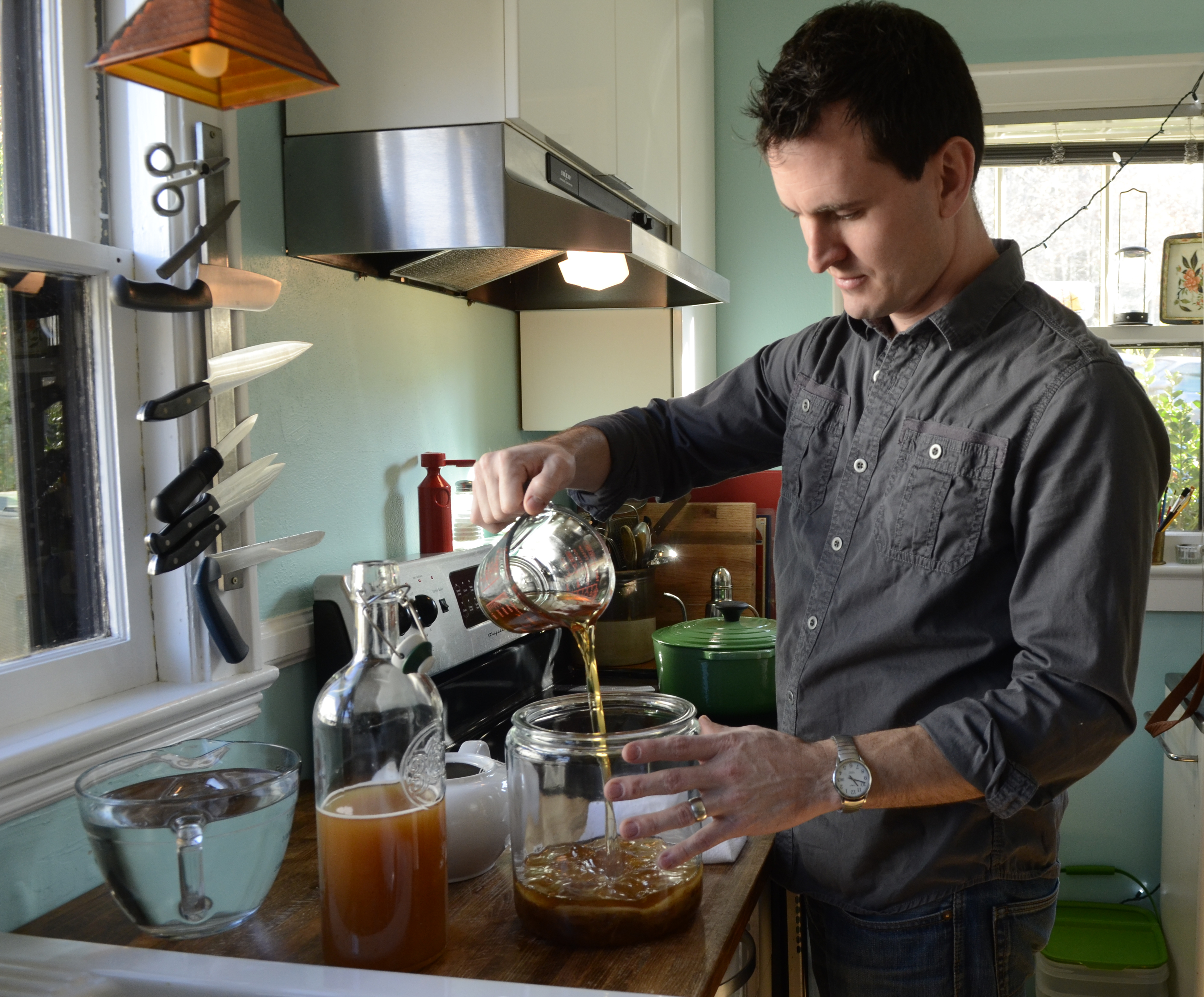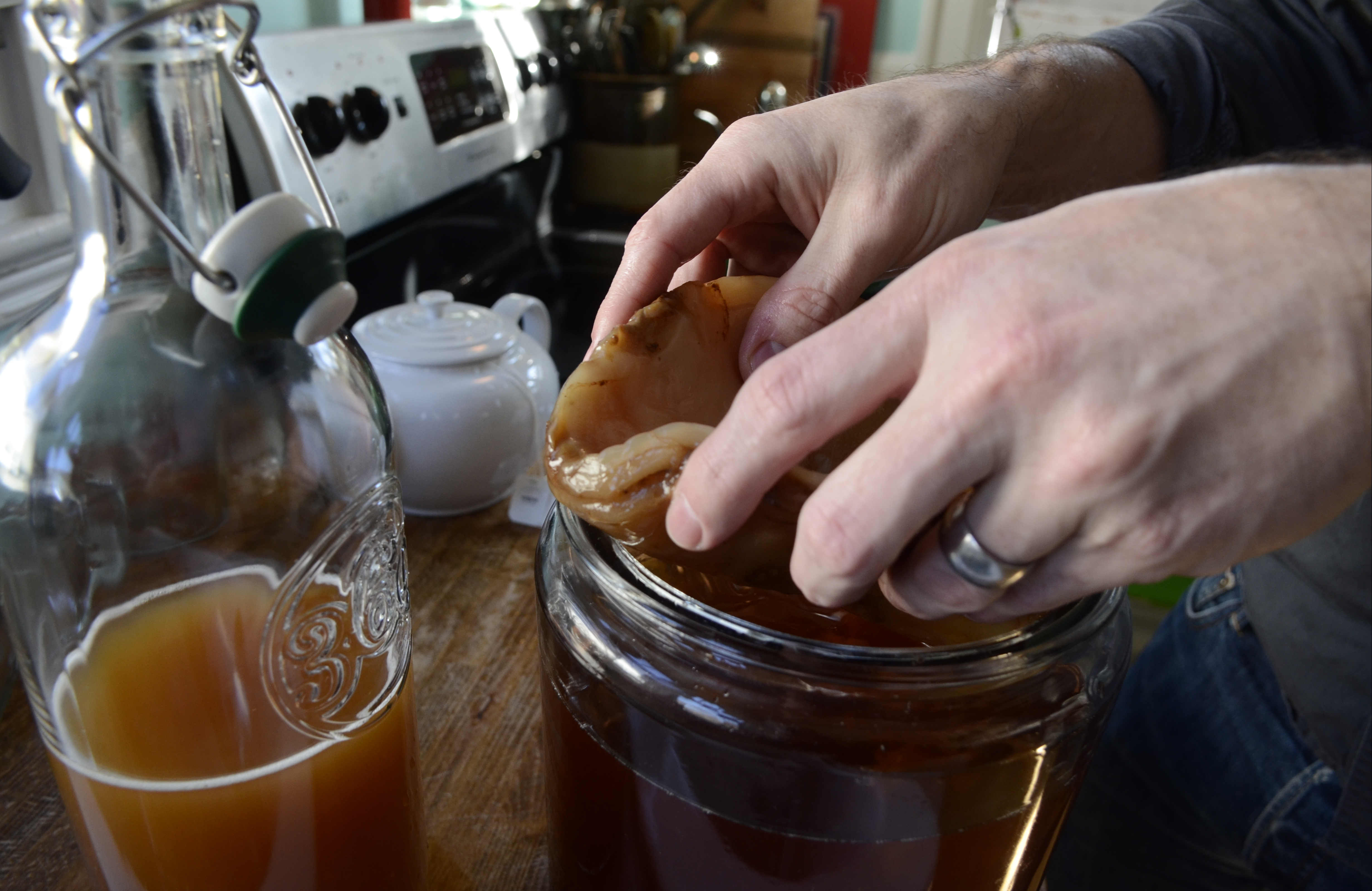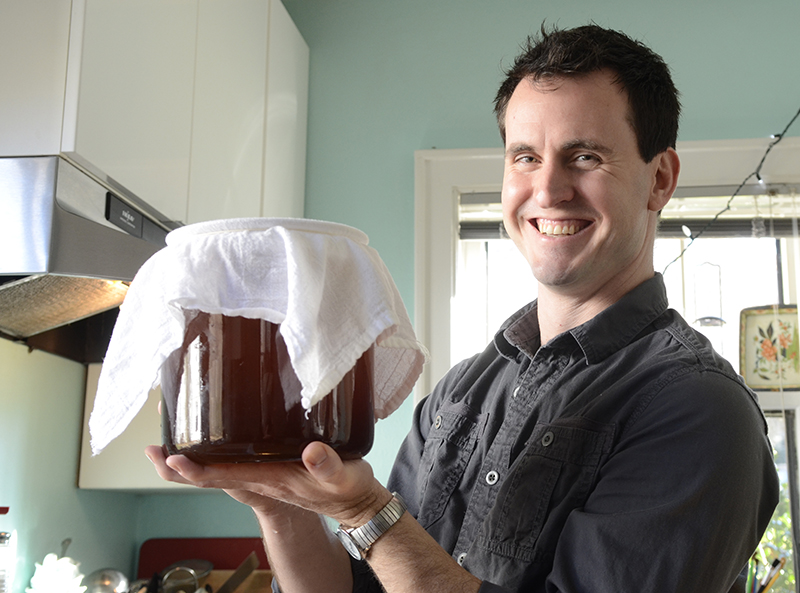Kombucha: Fermented tea touted as tonic by some, as joke by others
Tuesday, December 10, 2013
BREWING KOMBUCHA• Obtain a SCOBY or "mother" kombucha. Like an Amish friendship bread, most people get them from friends of friends, but you can also order them online. Make sure you get about a cup of the existing "starter" liquid with your SCOBY.• Brew a pot of tea per the amount of kombucha you intend to brew; family-size tea bags work well. Some advise leaving the tea bags in for longer than usual. You can use any kind of tea according to your taste. Add a cup of white sugar per gallon while the water is hot.• Let the tea sit until it is room temperature, usually a couple of hours. It needs to be around 70-74 degrees. Too-high temperatures will kill the living bacteria in the SCOBY and thwart the brewing process.• Put the SCOBY and the starter liquid in a glass or stainless steal container. Do not use copper or other metals as they can leach toxins into your brew.• Cover the top with a breathable cloth and secure it around the mouth of the jar with a rubber band.• Wait for about a week, until a "mushroom" forms on the top of the brew. The fermentation process goes faster in warmer temperatures, so winter brewing may take longer.• Taste test to your liking. The longer you leave it, the more bitter and vinegar-like it will taste.ONLINE TUTORIALS• www.wholeliving.com/134310/make-your-own-kombucha• www.instructables.com/id/Make-Your-Own-Kombucha-At-Home/• www.getkombucha.com/buy-kombucha/?gclid=COy-6um6o7sCFW5o7Aodb38Azg
It all starts with what looks like a slimy rubber pancake. Bethyn Merrick-Nguyen's friends call it an "alien face eater." It's also called a "mother."
The real name for the weird-looking thing is a SCOBY, or a symbiotic colony of bacteria and yeast. When a SCOBY is fermented with tea, it makes kombucha, the effervescent beverage that's showing up on the shelves of health food stores. But kombucha is also easy to brew at home, and some Chattanoogans are joining the experiment.
Like beer, kombucha is made from a yeast culture that feeds on sugar. Unlike beer, it is considered by some to be a health elixir rich in probiotics -- the good bacteria that aid digestion and immunity and manage acid levels in the body. The fizzy drink with a slightly sour flavor is in the same family as other live fermented foods like sauerkraut, yogurt, kimchi and miso.
Some proponents credit it with everything from preventing hangovers to curing cancer.
Merrick-Nguyen, a 24-year-old who works at The Crash Pad hostel off Main Street, brews it for its taste, not for health reasons.
"I don't drink beer, but I was interested in the craft of brewing," says Merrick-Nguyen.
She brews it with black, green or herbal tea, then experiments with fruits, herbs, spices and juices to create different flavor profiles.
"I try everything," she says. "Watermelon was bad -- it just tasted like rotten melons."
Paul Ferris of St. Elmo brews his kombucha stronger by using plain black tea, then seals a portion in a growler -- a glass jug -- and lets it ferment longer, making it extra fizzy. He drinks the healthier kombucha in place of soda and sometimes shares it with his three kids.
Ferris, who works at the software company QuickCue, became interested in brewing kombucha about a year ago after hearing a radio broadcast about the link between probiotics and good mental health.
"Plus, it just seemed like a fun experiment to try," he says.
If you're not up to the challenge of home brewing, you can find kombucha at most organic grocery stores. Whole Foods carries six brands at $3 to $5 a bottle. It also offers offer Asheville, N.C.-based Buchi kombucha on draft in the cafe, where you can fill up a growler for around $10.
Whole Foods Grocery Team leader Hugh Bradburn first learned about kombucha in the late '90s in Asheville as part of the fermented food movement. And although its has been growing in popularity in the past few years, "kombucha has been around forever," he says, "and it's here to stay."
"For me, live cultures and probiotics provide a natural sense of well-being," says Bradburn. "It gives me a boost. If I have a cold, I drink a kombucha."
Pam Kelle, a local dietitian and "food coach," has been drinking it for years and says gut health is the cornerstone for general health. Kombucha, she says, can be a part of building that.
Some, though, are less convinced.
"I think it's just another health trend, like juicing or the Paleo diet," says Amy Autuori, a registered dietitian at Memorial Hospital. "And I've heard it tastes horrible. Why don't people just eat a yogurt and drink some black tea?"
Other professionals have warned against consuming too much kombucha, especially home-brewed blends that can vary in acidity. High levels of acid in the body can be dangerous and even deadly in rare cases.
Local kombucha fans agree that it is not a wonder cure-all, but simply a matter of taste -- an acquired one.
"I like funky things," Bradburn says. "I like smelly cheeses. I like to be able to taste that funk and know that it's really a live food. There's an aftertaste that might be offensive to some people, but to me, eating things that are alive means they're more intact."



